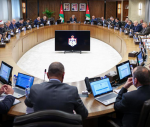You are here
Jordanians shifting dining preferences during Ramadan
By Maria Weldali - Mar 17,2024 - Last updated at Mar 17,2024
AMMAN — Dining out is on the decline this Ramadan and the shifting preferences of customers are changing the dine-out culture in Jordan, according to stakeholders.
Since the start of the fasting month of Ramadan, foot traffic has been limited in restaurants and Iftar diners, Raed Hamada, head of the Tourism, Services and Restaurants Committee at the Amman Chamber of Industry (ACI) told The Jordan Times, adding that lower domestic household spending and tourism-related spending at restaurants and eateries have certainly factored into the industry’s lower performance.
There are restaurants that depend on tourists and visitors more than their dependence on local customers, he further noted.
Previously, in a statement made available to The Jordan Times, ACI representative attributed the decline in restaurant activity to a significant shift in consumption patterns, driven by reduced purchasing power among citizens and the repercussions of the Israeli aggression against the Gaza Strip.
Speaking with The Jordan Times on Saturday, Omar Awwad, president of the Jordan Association for Restaurants and Sweet Shops Owners, stated that “this Ramadan, people are as usual having family gatherings for Iftar during the first week or ten days of the holy month”. However, there is an apparent decline in overall business activity.
Awwad said that traffic is expected to slightly bounce back after the second week of Ramadan, but it seems that people will not be eating out as much. He also highlighted that fundamental shifts have occurred since the war in Gaza began.
Additionally, many customers are cutting back on their restaurant visits due to tough economic circumstances, but still takeouts and deliveries are on the rise.
“We have also noticed a trend of customers who are increasing going to coffee places after Iftar, but Suhoor buffets are not receiving that much of people,” he said. Last month, demand for the local restaurants sector has in general declined by 30-40 per cent, and during the first week of Ramadan it has dropped by more than 20 per cent when compared with the same period last year.
Beesan Said, 20, who is an employee at a fast-food restaurant, said that “currently there are branches that outperform because customers prefer going there… so far, we have a better base when compared with last year and no decline is observed”.
She added that the restaurants that are best positioned to succeed in growing their sales during Ramadan are the ones that offer a quick service and lower-priced fast-food options.
Mahmoud Taha, an employee at a local restaurant based in Irbid, told The Jordan Times that restaurants are offering various discounts, but lower prices and more deals do not necessarily mean more sales and traffic.
He pointed out that “this year’s cooler weather has had a reverse impact on many restaurants’ performance”,
Related Articles
AMMAN — The holy month of Ramadan is an opportunity for the local restaurant industry to rethink their service delivery operations that matc
AMMAN — Although public sector employees work fewer hours in Ramadan, from 10am to 3pm, others, such as workers at shopping centres an
AMMAN — Head of Tourism, Services and Restaurants Committee at the Amman Chamber of Industry (ACI) Raed Hamadah on Saturday said that dine-i

















